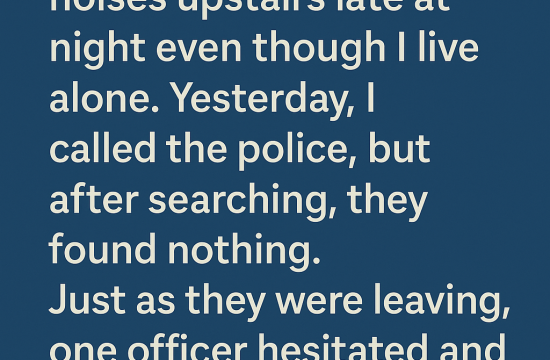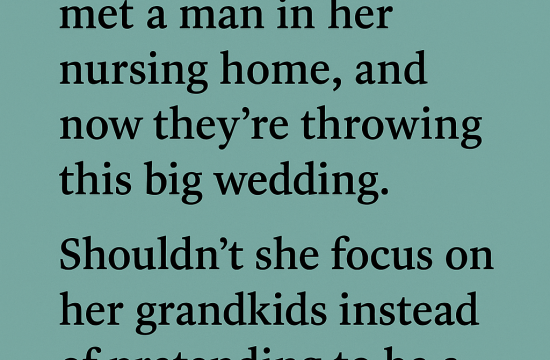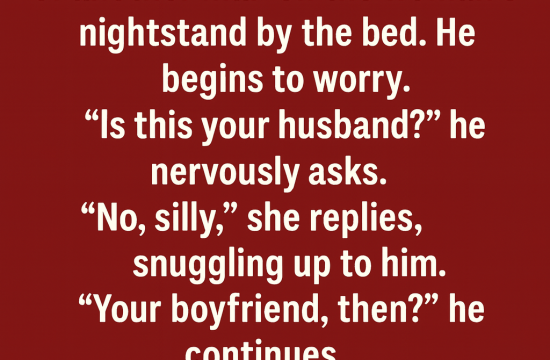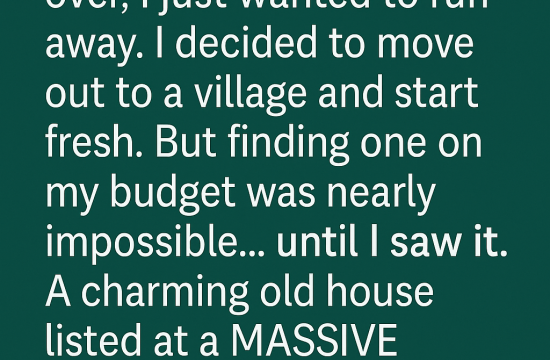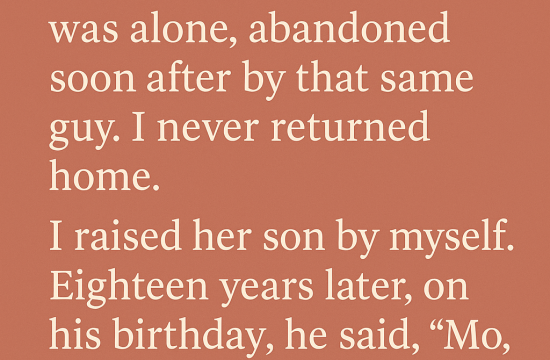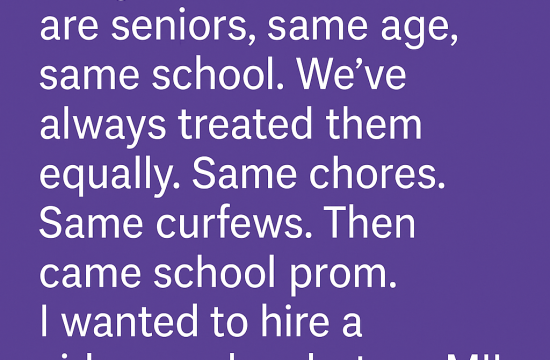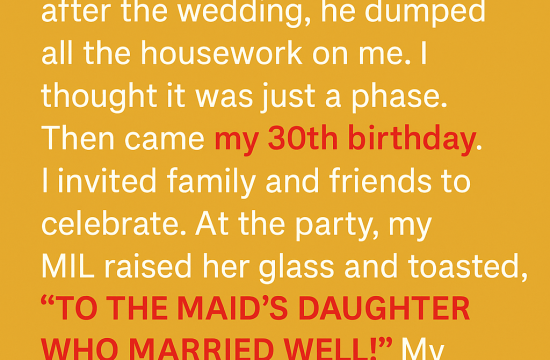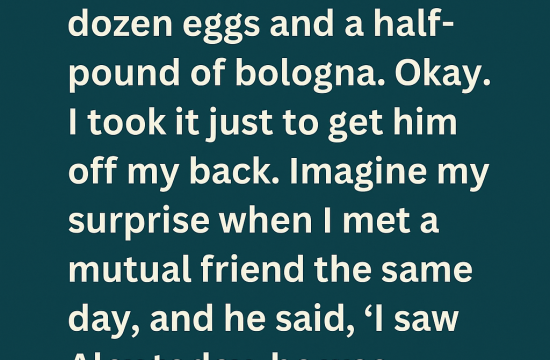When I handed my mom the keys to my car for a weekend getaway with her new boyfriend, I didn’t expect anything in return but a few extra miles on the odometer. Instead, she brought it back cleaner than I’d left it—shiny dashboard, full tank, even the floor mats vacuumed. It was almost suspiciously perfect.
Except for one thing.
The glove box had been disturbed. Papers shuffled, things moved around. I noticed it immediately.
“Find what you were looking for?” I asked, keeping my tone light.
She blinked, caught off guard, then said, “You kept that photo?” Her voice was sharp with surprise. “I thought I burned every copy.”
My stomach dropped.
That photo had been sitting there for years. Folded, stained, forgotten—but never thrown away. It was me and Dad, standing at the lake’s edge, dripping wet from a summer swim, smiling like nothing could touch us. Taken just weeks before our whole world unraveled.
“What do you mean you burned every copy?” My voice didn’t waver, but my hands did.
She leaned against the hood, speaking as if we were discussing the weather. “After the divorce, I needed a clean slate. I went through everything.”
She wasn’t lying. She’d erased him like chalk in the rain. No photos. No souvenirs. Not even the cheesy mugs he loved. At sixteen, I’d walked into a house where my dad no longer existed—and apparently, neither did my memories of him.
I pulled the photo from behind a crumpled insurance card. His grin, his eyes—they still caught me off guard. I’d always thought I looked more like Mom, but in that picture, there was no denying where my smile came from.
“You tried to erase him,” I said quietly.
Her expression softened. “You don’t know the full story.”
I almost said, I know enough. But there was something in her voice—tired, unfinished.
“Then tell me,” I said.
We walked in silence past familiar porches and rustling trees. She kept glancing at me, like she was calculating how much to reveal. Finally, she said, “Your father wasn’t the man you remember.”
“I know he wasn’t perfect, but—”
“No, Jules. He cheated. For years. Not once. Not with one person. I kept forgiving until I couldn’t anymore.”
I stopped walking. “Why didn’t you tell me?”
“Because you needed someone to believe in. And back then, it wasn’t going to be me.”
Her words hit like wind against an old wound.
“And that lake day?” I asked.
She looked down. “He told me he wanted some time with you. I didn’t know until later he’d come home that morning from someone else’s bed.”
Her voice cracked. Suddenly, the silence of all those years didn’t feel like punishment—it felt like heartbreak.
“I didn’t keep the photo to hurt you,” I said. “I just… needed something to hold onto.”
She nodded. “And I shouldn’t have gone through your things.”
That night, I dug out the shoebox I’d hidden in my closet—ticket stubs, his old watch, a birthday card in handwriting I hadn’t seen in a decade. It all looked different now, like a story I’d only read half of.
A few days later, a letter arrived.
No return address. Just my name in familiar pen.
I’ve been trying to reach you. I was with your father at the end. He wasn’t proud of everything, but he loved you. Deeply. I can answer your questions—if you want to know more. — M.
No phone number. Just a P.O. box.
I showed it to Mom. Her face went pale. “That’s from Mara,” she said, nearly spitting the name. “She was the last one.”
“The one he left you for?”
She nodded. “I don’t know why she’s reaching out now. Maybe guilt. Maybe she wants to rewrite the story.”
I told myself I wouldn’t respond. But a part of me—hungry for answers—couldn’t resist.
A week later, another letter came. This time with a photo: Dad, pale and thin, in a hospice bed. Mara beside him.
He didn’t want you to see him like that. But he talked about you every day. The regret. The missed birthdays. He said you had your mother’s strength. He cried every night the last two weeks.
I showed Mom. She stared at the photo for a long time.
“I didn’t know he was sick,” she whispered.
“Would it have changed anything?” I asked.
“Maybe. Maybe not.”
Over the next few months, Mara and I exchanged letters. I learned Dad had tried to call me on my 21st birthday but panicked and hung up. He’d started therapy. And he’d left a box with Mara—for me. Inside: a journal.
When I finally met her, she wasn’t glamorous or smug—just tired. She admitted that breaking up our family hadn’t been her plan. That it began carelessly and grew into something irreversible. That he talked about Mom often, and how badly he’d failed us both.
“He was a mess,” she said. “But his love for you? That was real.”
It didn’t make everything better. But it helped.
When I brought the journal home, it sat unopened for days. When I finally read it, it was messy, sad, and brutally honest. Some pages made me laugh. Others made me cry. One shattered me:
I wish I’d told Jules the truth. I was scared she’d hate me. But maybe she already does.
I didn’t hate him.
I hated the silence.
When I finished, I asked Mom if she wanted to read it. She hesitated, then agreed. A week later, she handed it back, her eyes rimmed red.
“I still don’t like what he did,” she said. “But I understand now… why you kept that photo.”
We hugged. A real hug. The kind that says I see you now.
That photo from the glove box now sits framed on my bookshelf—right beside one of me and Mom, laughing in a coffee shop. I kept them both.
Because life is messy. People are flawed. And sometimes, the truth doesn’t erase the love—it just changes the shape of it.
If you’re still holding onto a memory that once gave you comfort, even if it wasn’t the full story—don’t be ashamed. We remember people how we needed them. But when the truth finally comes, look it in the eye.
That’s when real healing begins.




